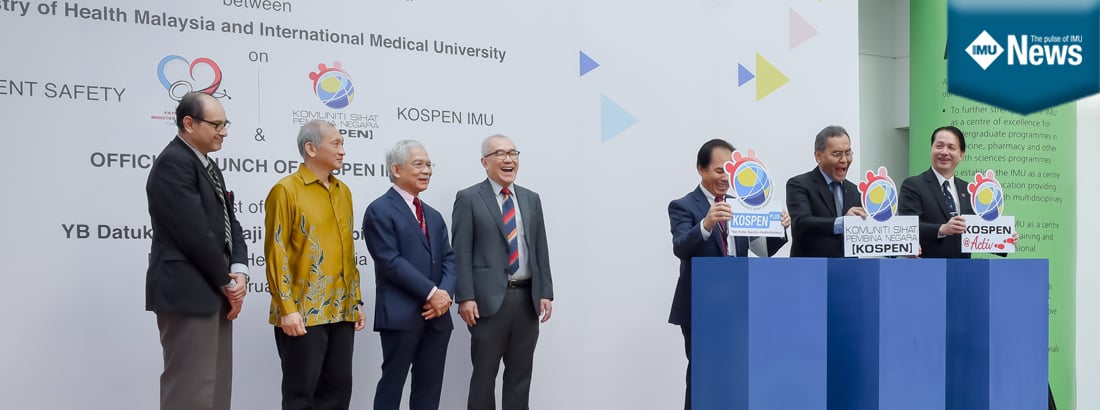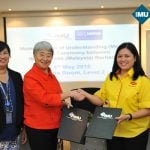Kuala Lumpur, 28 February 2019 – The signing of a Memorandum of Understanding (MoU) between the Ministry of Health Malaysia (MOH) and the International Medical University (IMU) today marked the first private led partnership in the adoption of the MOH’s Komuniti Sihat Pembina Negara (KOSPEN) programme. This partnership will encompass three focuses which are (i) KOSPEN Komuniti (initiative for communities), (ii) KOSPEN PLUS (initiative for staff at workplace) and (iii) KOSPEN Activ (initiative for individuals) with the objective to increase awareness concerning risk factors of Non-communicable Diseases (NCD) and creating a conducive environment in various communities for better lifestyle habits. 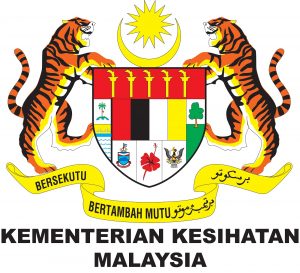
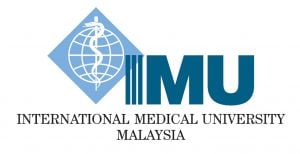 The MoU was signed on behalf of MOH by Datuk Dr Noor Hisham Abdullah, Director General of Health Malaysia and for IMU by Prof Abdul Aziz Baba, Vice-Chancellor and CEO of IMU. The ceremony was witnessed by Datuk Seri Dr Dzulkefly Ahmad, Minister of Health Malaysia and Tan Sri Dato’ Dr Abu Bakar Suleiman, Chairman of IMU Group. Also present were Dato’ Dr Chong Chee Kheong, Deputy Director General of Health (Public Health), MOH; Prof Peter Pook, Deputy Vice-Chancellor Academic of IMU and representatives of MOH and IMU comprising of both staff and students. KOSPEN is an initiative established by the ministry in 2014 in its endeavour to address the issue of increasing NCD cases and its burden while also elevating the quality of life amongst Malaysians through community empowerment and involvement in public health programmes, especially at grassroots level. The KOSPEN-IMU partnership is essentially a public health service transformation initiative to motivate the IMU community of staff and students to adopt simple daily practices that will have a positive impact on their health. It also aims to increase the involvement of the IMU community in KOSPEN activities at the grassroots level through various collaboration with the ministry such as health and environment activities.
The MoU was signed on behalf of MOH by Datuk Dr Noor Hisham Abdullah, Director General of Health Malaysia and for IMU by Prof Abdul Aziz Baba, Vice-Chancellor and CEO of IMU. The ceremony was witnessed by Datuk Seri Dr Dzulkefly Ahmad, Minister of Health Malaysia and Tan Sri Dato’ Dr Abu Bakar Suleiman, Chairman of IMU Group. Also present were Dato’ Dr Chong Chee Kheong, Deputy Director General of Health (Public Health), MOH; Prof Peter Pook, Deputy Vice-Chancellor Academic of IMU and representatives of MOH and IMU comprising of both staff and students. KOSPEN is an initiative established by the ministry in 2014 in its endeavour to address the issue of increasing NCD cases and its burden while also elevating the quality of life amongst Malaysians through community empowerment and involvement in public health programmes, especially at grassroots level. The KOSPEN-IMU partnership is essentially a public health service transformation initiative to motivate the IMU community of staff and students to adopt simple daily practices that will have a positive impact on their health. It also aims to increase the involvement of the IMU community in KOSPEN activities at the grassroots level through various collaboration with the ministry such as health and environment activities.
| Among the strategies that have been planned for the KOSPEN-IMU partnership: |
|---|
| • The development of healthy lifestyle practices in line with increased self-esteem, the strengthening of socio-economic levels and sustainable development |
| • Broadening the reach of KOSPEN’s community programmes to form a healthy community at IMU free of NCD such as diabetes, cardiovascular diseases, cancer and chronic respiratory diseases |
| • Establishing a group of trained health volunteers among IMU community members serving as agents of change in encouraging healthy practices within the community |
| • Reviewing programmes and activities under IMU through the application of basic elementary education and early detection of NCD risk factors |

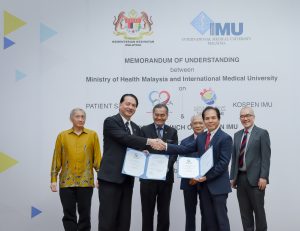 “Being the leader in healthcare education in Malaysia, the onus is on us to practise what we preach. Our responsibility towards the IMU community is to ensure that they have full access to a healthy culture and every opportunity available to further their awareness and knowledge on how to prevent NCD while leading an optimum lifestyle for better well-being,” says Prof Abdul Aziz Baba. “Prior to signing the MoU, we have worked closely with the ministry, lending our expertise in outlining the necessary steps and involvement to develop an environment conducive for healthier living for the IMU community. The institution is honoured to have been chosen by the ministry for its KOSPEN initiative, which we wholeheartedly support for its efforts in reaching out to Malaysians via workplace health programmes to ultimately decrease the risk factors for NCD. Working with the ministry under KOSPEN has accorded us the best access to the application of health policies by the government as well as immense support to implement programmes and activities for the benefit of our staff and students,” he adds.
“Being the leader in healthcare education in Malaysia, the onus is on us to practise what we preach. Our responsibility towards the IMU community is to ensure that they have full access to a healthy culture and every opportunity available to further their awareness and knowledge on how to prevent NCD while leading an optimum lifestyle for better well-being,” says Prof Abdul Aziz Baba. “Prior to signing the MoU, we have worked closely with the ministry, lending our expertise in outlining the necessary steps and involvement to develop an environment conducive for healthier living for the IMU community. The institution is honoured to have been chosen by the ministry for its KOSPEN initiative, which we wholeheartedly support for its efforts in reaching out to Malaysians via workplace health programmes to ultimately decrease the risk factors for NCD. Working with the ministry under KOSPEN has accorded us the best access to the application of health policies by the government as well as immense support to implement programmes and activities for the benefit of our staff and students,” he adds.  KOSPEN’s activities under this initiative aim to push forward its five major NCD prevention scopes that include healthy eating, regular exercising, a smoke-free lifestyle, weight management and NCD disease detection at an early stage through health screenings. All activities and programmes to be implemented under the KOSPEN-IMU partnership will be based on these scopes. Volunteers from IMU will receive training from the ministry for the implementation of the programme’s initiatives. The ministry aims to strengthen this collaboration by providing necessary insights in designing appropriate workplace activities including providing promotional support and student postings. Aside from that, the Ministry of Health and IMU will also explore the possibilities for further collaboration in organising short-term training courses for mutual benefit. “We are 100 per cent committed in applying the policies and scopes outlined in the KOSPEN-IMU partnership for the benefit of our community. To ensure its success, our coordinating team will work hand in hand with the ministry to do whatever it takes to build a healthier IMU community. By creating a healthy working environment, we are directly affecting the health of our staff and students. We want to empower the IMU community to take charge of their own health and make sound lifestyle decisions that will create positive impacts in the long run,” says Prof Abdul Aziz Baba. “I would like to thank and congratulate the International Medical University, as it is eventually the first Higher Institution to have an understanding and willingness to work hand in hand with KOSPEN. With this unity between both parties, we hope the NCD rates will reduce in our country. In short, we hope this union would create an awareness to the public for the betterment of the new generation,” said the Health Minister, Datuk Seri Dr Dzulkefly Ahmad.
KOSPEN’s activities under this initiative aim to push forward its five major NCD prevention scopes that include healthy eating, regular exercising, a smoke-free lifestyle, weight management and NCD disease detection at an early stage through health screenings. All activities and programmes to be implemented under the KOSPEN-IMU partnership will be based on these scopes. Volunteers from IMU will receive training from the ministry for the implementation of the programme’s initiatives. The ministry aims to strengthen this collaboration by providing necessary insights in designing appropriate workplace activities including providing promotional support and student postings. Aside from that, the Ministry of Health and IMU will also explore the possibilities for further collaboration in organising short-term training courses for mutual benefit. “We are 100 per cent committed in applying the policies and scopes outlined in the KOSPEN-IMU partnership for the benefit of our community. To ensure its success, our coordinating team will work hand in hand with the ministry to do whatever it takes to build a healthier IMU community. By creating a healthy working environment, we are directly affecting the health of our staff and students. We want to empower the IMU community to take charge of their own health and make sound lifestyle decisions that will create positive impacts in the long run,” says Prof Abdul Aziz Baba. “I would like to thank and congratulate the International Medical University, as it is eventually the first Higher Institution to have an understanding and willingness to work hand in hand with KOSPEN. With this unity between both parties, we hope the NCD rates will reduce in our country. In short, we hope this union would create an awareness to the public for the betterment of the new generation,” said the Health Minister, Datuk Seri Dr Dzulkefly Ahmad.
| In the News | |
|---|---|
| Facebook, 28 February 2019 | 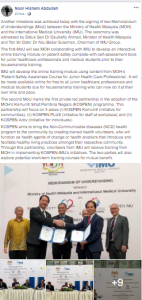 |
| MIMS Pharmacy, 21 March 2019 | Patient Safety and Public Health Should Be Made a Culture |




